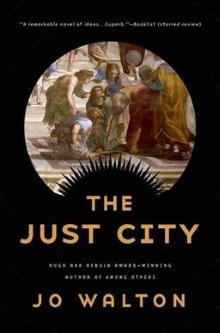
It’s been more than two years since I read Jo Walton’s What Makes This Book So Great and I’m still mining it for ideas on what to read next. So when a thread on Broken Forum talked about big idea books in science-fiction and multiple commentators cited this as a great example, it felt apt to pick this up. As I only recently noted, big ideas are rather rare even in science-fiction and what could be a bigger and more ambitious than trying to create Plato’s famous Republic.
The goddess Athena embarks on a project to create Plato’s Republic on the island of Thera before a volcano partially destroys. She uses her powers to draw philosophers who have personally prayed to her from across different eras and provides them with robotic workers for laborious work. One such person is Maia, a woman from 19th-century England who loves reading and learning but has no realistic prospects in life except to be married into a well-to-do family. But others are famous persons such as Cicero, Lucrezia Borgia and later even Socrates himself. To populate the city, they buy intelligent slave children from various eras and have them be educated by the masters. Two of them are Simmea, a girl who loves the life the city is able to give her and supports its cause, and Kebes, a boy who feels that he has had no choice in this matter and is determined to rebel. Rounding out the cast of characters is the god Apollo himself who incarnates as a mortal and joins the city as one of the slave children.
Right off the bat, I have to say that this novel just pushes all of the right buttons for me. It’s pretty clear that it was written precisely for people like me as the target audience and as such, so many of the scenes are so satisfying to read. There’s the moment, for example, when Simmea sees a Botticelli painting hanging in the dining hall she has been assigned to and is stunned, so when Socrates, true to form, goes around the city to talk to the robots to test if they are intelligent. Then there’s the Renaissance-era philosopher Ikaros who tries to reconcile Christianity with the existence of the Greek gods, or Apollo explaining how the gods can freely exercise their powers only during those times when history isn’t already set in stone.
I also love that the novel is predominantly written with a female voice so that issues like menstruation, pregnancy and postpartum depression and men not quite understanding the importance of consent in matters of sex feature heavily. This is especially important given that the most famous figures of philosophy present there are of course men and so even though the male and female masters are supposed to be equal, due to their fame, the men are still more respected. Indeed Apollo’s motivation for being there is to understand why any woman would want to refuse having sex with him and so reading about his friendship with Simmea is a real delight.
One difficulty that I had is that the book seems to assume that the reader has at least some passing familiarity with Plato’s The Republic and I haven’t read it at all. For the most part, it’s possible to work out what Plato was advocating from the context and the explanations of the masters but knowing about exactly what Plato wrote would have been very useful. A more serious problem is the casual use of the Greek words denoting different types of love. Again, you can more or less work out what they mean from the conversation but I preferred to look up a more detailed reading of it from outside sources to get a better understanding of the nature of various relationships described here.
Another disappointment that is probably inevitable is that Walton’s prose is fine in a very workman-like way but not exactly inspired. It’s very reasonable writing for a science-fiction novel and evokes a contemplative, thoughtful mood that is appropriate for a story about philosophers. Yet this is a novel in which great orators like Cicero and Socrates are characters. It’s too much to hope that any other writing could hope to copy their style, but it’s still a bit disappointing that these greats most just speak in a plain, ordinary manner even when it comes to addressing the gods. Similarly the arguments employed by Socrates and the others in debate are sound and logical, but not anything that strikes the reader as being brilliant. More generally, this book by its very premise is a project of soaring ambition and while Walton does a reasonable job at doing it justice, it doesn’t quite reach the heights of greatness that one imagines which you all these great names out of history together in a room with Athena and Apollo.
While I’d hoped it would be better, I still enjoyed this book very much and enjoyed every word of it. The characters are great and I loved Apollo’s growth and realization of his previous flaws and mistakes over the course of the book. I will most definitely read the rest of the trilogy and I would strongly recommend this to anyone who has affection for the classical philosophers of Antiquity.
One thought on “The Just City”